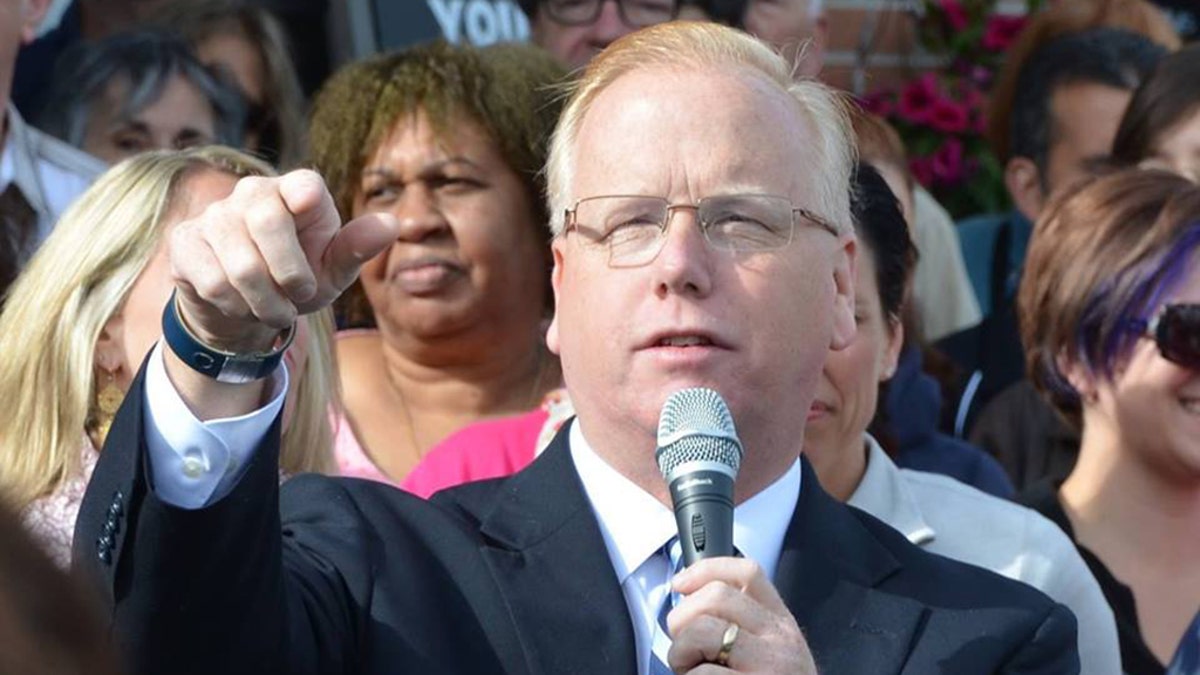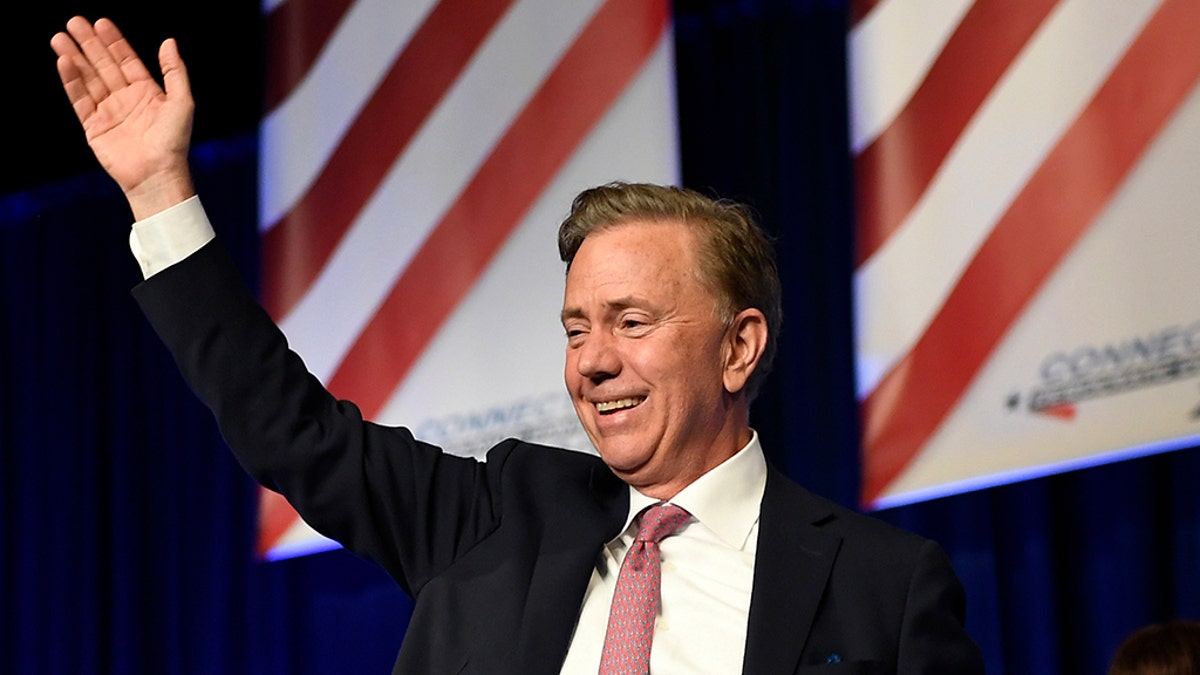
Republican gubernatorial candidate Bob Stefanowski is running on a Trumpian economic policy (Stefanowski campaign)
After years of Democratic rule and high taxes in Connecticut, a corporate executive running for governor on a Trumpian economic platform is vowing to bring fiscal stability - and big business - back to the Nutmeg State.
Connecticut native Bob Stefanowski, with an assist from legendary former Reagan administration adviser Arthur Laffer, has crafted an economic plan the pair believes will reverse the state’s fiscal crisis.
“I firmly support Trump’s economic policy and the way he’s re-cutting deals and streamlining government, and we desperately need some of that leadership in Connecticut,” Stefanowski, a former chief executive officer of multiple divisions at General Electric and former chief financial officer at UBS Investment Bank, told Fox News.
Connecticut has seen an exodus of major corporations in the last several years under the leadership of Democratic Gov. Dannel Malloy—with Stefanowski’s former company General Electric, and Aetna, among the major losses.
Malloy announced he would not seek re-election come November—opening the door for several Republican and Democratic gubernatorial hopefuls.
There are currently six GOP primary candidates. The majority of candidates have served in some local or state political office, while Stefanowski does not have any political experience.
“You need someone—Trump is a good example of this—who has run things before, who has negotiated,” Stefanowski said. “I’ve got the skill set to deliver.”
'You need someone--Trump is a good example of this--who has run things before, who has negotiated. I've got the skill set to deliver,'
Stefanowski decided to bypass the state’s Republican convention. Instead, he petitioned to be added to the primary ballot.
“The current convention process discourages just the type of candidates most voters want — a fresh, outside and real world perspective from a new candidate who has not been courting potential convention delegates for years,” Stefanowski wrote to the chairman of the CT GOP.
Connecticut requires a candidate petitioning gather 9081 signatures, or 2% of registered Republicans. Stefanowski told Fox News he collected 16,000 Republican supporters for his petition.
The Connecticut secretary of state has until the end of June to confirm Stefanowski's slot for the primary—which will be held in August.
Stefanowski has proposed the repeal of the state’s income tax—a controversial measure that was first put in place 25 years ago.

Boughton campaign Facebook (Stefanowski will compete against Mayor Mark Boughton in the Connecticut primary race in August)
“People are leaving. We need to reverse what Democrats have done for the last eight years,” Stefanowksi said.
Other Republican candidates, including Danbury Mayor Mark Boughton, who won the GOP endorsement and former Trumbull First Selectman Tim Herbst, who qualified for the primary, have also campaigned on the idea of rolling back the income levy.
Prior to 1991, Connecticut did not have a state income tax—attracting well-heeled workers employed in Boston and New York City to live in the prosperous suburban state.
According to Laffer, author of the famous tax algorithm known as "the Laffer Curve," Connecticut was one of the top performing states in the nation, before the introduction of the income tax by former Democratic Gov. Lowell P. Weicker Jr.
Now, Connecticut is performing at the very bottom in the U.S., with a credit rating ranked the third worst in the country, behind New Jersey and Illinois.
“It is a catastrophic, 180 degree turn,” Laffer, whose formula showed that higher taxes eventually result in lower revenue for the government, told Fox News. “I attribute that turn around to the income tax and change in philosophy of government in the state of Connecticut.”
Laffer blasted other Republican candidates, suggesting they were “just spouting rhetoric,” touting Stefanowski as someone who “knows how to bring companies back in.”
“I’ve never seen a gubernatorial candidate, let alone a governor, who has the abilities and the skills that Bob does to effectuate real change,” Laffer said. “This guy knows how to fix the plumbing as well as run the company.”
Stefanowski and Laffer told Fox News that Trump’s chief economist Larry Kudlow also reviewed and approved Stefanowski’s economic plan for Connecticut.
Connecticut, like much of New England states, is historically blue. But in recent years, a wave of Republicans have taken the governor’s mansions, including Gov. Charlie Baker, in Massachusetts; Gov. Chris Sununu, in New Hampshire; Gov. Paul LePage in Maine and Gov. Phil Scott in Vermont.
Connecticut last elected a Republican governor in 2004, with Jodi Rell, who was preceded by former Republican Gov. John Rowland in 1995.
Despite the left-leaning electoral base, Malloy currently is ranked the least popular governor in the nation. GOP officials hope that ranking could inspire voters to shift towards the center, or to the right, when considering gubernatorial candidates come November.

AP (Connecticut gubernatorial candidate Ned Lamont was endorsed by the state's Democratic Party. He ran against current Gov. Dannel Malloy during the 2010 primary.)
The top Democratic candidate that the eventual-GOP nominee will have to face in the general is Democratic Party-endorsed businessman Ned Lamont.
This is his second bid for governor, having lost to Malloy in the primary in 2010. Lamont also ran unsuccessfully for U.S. Senate in 2006 against former Independent Sen. Joe Lieberman. Lamont was a former selectman in the wealthy town of Greenwich, and served for three terms on the town finance board.
Lamont believes the state’s economy is strong.
“Connecticut is actually, the economy is doing better than we know,” Lamont told Fox 61. “We have tens of thousands of really good paying jobs.”
Lamont is focused on training the state’s workforce, which he called “one of the best workforces in the world.”
When asked whether his policies were too similar to Malloy’s, Lamont pushed back, saying: “I’m the guy that tried to challenge him and make sure he didn’t have a first term.”




